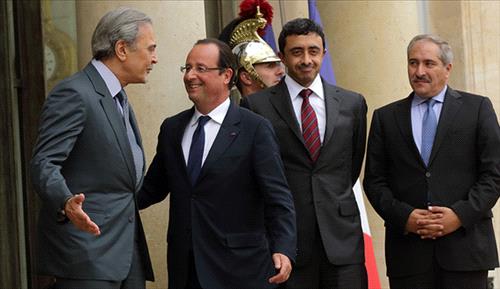Ammon News - AMMONNEWS - The expression “Jordan maintains equal distance from each of the Gulf countries” is put to the test today, after the recent dispute that escalated between Riyadh, Abu Dhabi and Manama on one hand, and Doha on the other. In the past, Jordan’s relations with Qatar would sometimes be tense for various reasons, as were its relations with Kuwait during the Iraqi invasion. But, in an attempt to avoid ideological stances, Jordan always looked for an opportunity to overcome its rivalry with others for better communication and to reach a solution.
Some look positively at the the Jordanian stances toward the Syrian crisis and the issues preoccupying the region in general. According to them, Jordan adopted a policy of positive vagueness to calculated policies that have protected the country and preserved its security, stability and relations with neighboring and regional countries, even though these countries do not share the same visions, goals, alliances, and policies as Jordan. At the other end, some — who have other views — believe that the Jordanian stances and policies a strategic confusion. Even though the current tactics have achieved some success, there are concerns that it will be temporary. This bickering may resurface today amid the dispute taking place within the Gulf Cooperation Council (GCC) after Riyadh, Abu Dhabi and Manama withdrew their ambassadors from Doha. This dispute, if it escalates, will be a new diplomatic challenge for Jordan.
Jordan’s wish to be treated in a preferential way, especially from the part of the Gulf countries, is still existent. Jordanian Prime Minister Abdullah Ensour said, “Jordan not joining the GCC was a strategic mistake, and a very big one. I do not know what the reason behind it was.” Ensour further explained, “Jordan is no different from Gulf countries in terms of policies. It did not stray from the Gulf’s [general] policy, and it is not an economic burden.” Ensour noted that Jordan's neighboring countries are facing security unrest, adding, “Let’s suppose we are to face troubles in Jordan, would it be better if these countries left us until trouble reaches us, while thinking that the conflict is still away from their borders?”
The enthusiasm expressed a few years back by Saudi Arabia to prompt the issue of Jordan joining the GCC is long gone in light of the recent events. On the other hand, questions are being raised currently about the formula that will govern the relationship between Jordan and the Gulf countries, as disparities between Gulf countries themselves over the regional issues and their developments, as well as their visions toward political Islam, Egyptian and Iraqi issues, are growing wider. These differences, in addition to the regional developments, are taking their toll on the internal Jordanian situation. The democratic national project is being crippled and the political sphere is failing to strengthen the internal front and drift it away from the limitations of foreign support and investment, while Jordanians are concerned about the troubles and the raging fires in the region.
On the other hand, in a harsh and unstable regional environment, the policy of brinkmanship adopted by Jordan becomes a daily strategic challenge in the face of the state. In order to overcome this challenge, it is important to deal with the issue of internal political reform and enforce the principles of governance and accountability amid the growing budget deficit.
The expression “Jordan is the safety net of Gulf countries” is being promoted as Jordan is shying away from adopting a final policy in Syria, Iraq, Egypt and Iran. This expression may cripple Jordan’s ability to take action. There is always a chance to reposition, and there is always more than one choice, but lack of choices is seen as a suicidal policy that has no place in Jordan and the political history of the country.
Those who advocate that the policy of Jordan being equal to Gulf countries will be altered affirm that Amman was never closer to Doha than it was to Riyadh and Abu Dhabi. They also believe that there is a possibility Jordan could deflect from neutrality. This is particularly true since the relations with Doha have turned cold when the latter did not live up to its financial commitment reached by the GCC. Additionally, the Jordanian approach toward political Islam in the region contradicts that of Qatar, and the Jordanian positive neutrality in the Syrian issue was adopted under the condition of not funding Islamic groups in Syria.
Those who are more cautious tend to evoke the words of Ensour in his last statement to the Qatari daily al-Watan, which was reported by Petra news agency, whereby he affirmed, “The Qatari policy is an internal issue.” He added, “There is not one country in the world that adopts a policy [that proves] satisfactory to all parties. What unites the two countries is a lot more than what separates them.” This statement is understandable by Gulf countries, knowing that 30,000 Jordanians work in Qatar.
*Al-monitor
